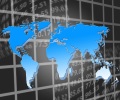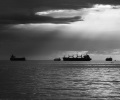G7 summit: Why there are eight more seats at the table this year

If the G7 were a dinner party, the host would be rummaging in the garage for the extendable table, hunting through boxes for extra placemats and cutlery.
This year’s host, Japan’s Prime Minister Fumio Kishida, has invited eight more guests to the summit, which starts on Friday in Hiroshima.
It is certainly a sign of the thorny agenda that ranges from the war in Ukraine to how much food reaches our own dinner plates. And it is also evidence of a rapidly changing international order, with much of the conversation focusing on two countries that are not on the guest list: Russia and China.
The annual gathering includes the world’s seven wealthiest democracies – Japan, the United States, the UK, France, Germany, Canada and Italy. The European Union, although not an official G7 member, also dispatches representatives. More recently, hosts have invited additional countries at their discretion.
But the economic might of the G7 is waning – in 1990, the group accounted for just over half of the world’s GDP, according to the International Monetary Fund. Now it’s just under 30%. It needs influential new friends.
So Mr Kishida, who is seeking a more global rather than Western coalition, has extended the table to accommodate Australia, India, Brazil, South Korea, Vietnam, Indonesia, Comoros (representing the African Union) and the Cook Islands (representing the Pacific Islands Forum).
The Japanese PM has made 16 overseas trips in the last 18 months, including India, Africa and South-East Asia, to prove to these regions that there is an alternative to Chinese and Russian money and power.
And his guest list for Hiroshima reflects these attempts to woo what many call the “Global South” – a term used for developing countries in Asia, Africa and Latin America, all of whom have complex political and economic ties to both Russia and China.
A not-so-united front
One of Mr Kishida’s clearest aims – to show a “united front” on Russia’s invasion of Ukraine – will also be one his biggest hurdles.
The G7 is reportedly trying to enforce more sanctions aimed at the energy and exports aiding Moscow’s war effort.
But many of the additional guests will not like this move. India, for instance, has refused to adhere to Western sanctions on Russian imports.
New Delhi has also not explicitly condemned Russia’s invasion of Ukraine. Their long-standing relationship aside, India is also reliant on energy imports and has defended its oil purchases, saying it cannot afford higher prices.
And it is far from alone. Emerging economies have been hit the hardest by rising costs, partly driven up by the war in Ukraine.
Now they fear that more sanctions could compel Moscow to terminate a Black Sea grain deal that enables vital exports from Ukraine. This could exacerbate food shortages and further drive up prices.
For others, this is not just about the personal cost of sanctions.
“Vietnam has a historically close relationship with Russia, which supplies at least 60% of their arms and 11% of their fertiliser,” says Nguyen Khac Giang, a visiting fellow at the Institute of South East Asian Studies in Singapore.
“Indonesia, although not heavily dependent on Russia, is a significant importer of Russian weapons and maintains good relations with Moscow.
“For these reasons, I don’t believe that Hanoi and Jakarta will explicitly object to, or support, further sanctions on Russia. Doing so would pose significant economic and political risks, while offering little benefit to them.”
What Mr Kishida must hope is that his hometown of Hiroshima, where the atomic bomb killed more than 100,000 people, will concentrate minds on the nuclear threat that Russia poses.
Visits around the city will be a constant reminder of the devastation the weapons can inflict, as well as supporting the message that invitees have a responsibility to ensure that such a weapon is never used again.
Pressure will also come from Ukrainian President Volodomyr Zelensky who will be there virtually to make an impassioned plea for his people who have already paid a hefty price.
That, however, might not be enough to resolve divisions on how far sanctions should go. And there is also the growing frustration among countries outside the G7 that their voices have all too often been ignored by the West. But analysts believe listening and treating these countries as partners is at least a start.
“It provides an opportunity to communicate their concerns with G7 leaders on a vast array of issues, from the war in Ukraine and the slowdown of the global economy, to security risks in East Asia, particularly regarding the South China Sea dispute and Taiwan,” says Nguyen Khac Giang of Vietnam and Indonesia’s involvement.
Countering China
Taiwan – and the tensions in the seas around it – has certainly become one of the biggest crises in the last year.
And as the leader of the only Asian G7 member, Mr Kishida sees the summit as a chance to respond to China’s increasing show of military force around the self-ruled island, which it claims. Tokyo’s message to the West is straightforward – your fight in Ukraine is also our fight, but that must work both ways.
But China, which is effectively sewn into global supply chains, is perhaps a trickier challenge than even Russia.
On a recent trip to Beijing, France’s President Emmanuel Macron warned that Europe should not get “caught up in crises that are not ours”. His words set off a minor row in the West, but they also renewed a lingering fear of abandonment across East Asia.
Many will remember the words of Republican Senator Lindsay Graham who, at the height of tensions with North Korea, warned: “If thousands die, they’re going to die over there.” Then came President Donald Trump’s threat to reduce US troops in South Korea.
China’s voice, analysts say, is heard clearly because, unlike Western democracies, its position does not change after every election.
Of course, the US, in the past year, has not wavered in its support for Ukraine, or in its commitment to Taiwan. And it has put on its show in the Pacific, alongside allies Japan, South Korea, the Philippines and Australia.
But the G7 isn’t just taking aim at China’s military ambitions. They are also concerned about what they call “economic coercion” by Beijing – retaliation for any actions that are seen as critical of China, such as cutting Australian imports in 2019, or targeting a South Korean business in 2017.
It’s unclear what form G7 counter-measures will take, or if it can even agree with its EU partners on how to act together. After all, Japan and the EU both count China as a top trading partner.
But the harder part will be persuading other countries to do the same, because much of the Global South is even more economically tied to Beijing.
China’s trade with Latin America is thriving, for instance. Beijing now accounts for 8.5% of the region’s GDP, while Brazil is among the countries that has a trade surplus with China. But in Africa, several nations, including Ghana and Zambia, are heavily indebted to China and struggling to repay loans.
Beijing has made its opinion of any G7-led measures clear: “China itself is a victim of US economic coercion and we have always been firmly opposed to economic coercion by other countries,” Chinese Foreign Ministry spokesperson Wang Wenbin said last week.
A new battleground
There is one region where the battle for influence is still unfolding – the Pacific Islands. It explains why the tiny nation of the Cook Islands, which represents Pacific Island countries, is on the guest list.
Hugely vulnerable to climate change, these island nations are leveraging their strategic importance with both the US and China.
Last year, Beijing signed a security pact with the Solomon Islands fuelling concerns that it was going to build a military base in the region. The US reacted swiftly, announcing a deal, including $810m in financial support, with 14 nations.
Now Mr Kishida’s coalition-building efforts will also depend on how the G7 agrees to address climate change and energy security, not least because that could cut countries’ reliance on Russian oil and gas, or Chinese aid.
But there might be a chink in the armour already. After the summit, President Joe Biden was headed to Papa New Guinea, becoming the first sitting US president to visit the Pacific Islands.
He is now cutting his trip short because of a crisis brewing back home over the US debt ceiling. That is a setback, according to Richard Maud, a senior fellow at the Asia Society Policy Institute and former Australian intelligence chief.
“The mantra in the region is all about turning up,” he said at a recent panel discussion. “Turning up is half the battle. China turns up all the time, and so the optics aren’t great.”
Source: BBC

 Hellenic Shipping News Worldwide Hellenic Shipping News Worldwide, Online Daily Newspaper on Hellenic and International Shipping
Hellenic Shipping News Worldwide Hellenic Shipping News Worldwide, Online Daily Newspaper on Hellenic and International Shipping






















 PG-Software
PG-Software